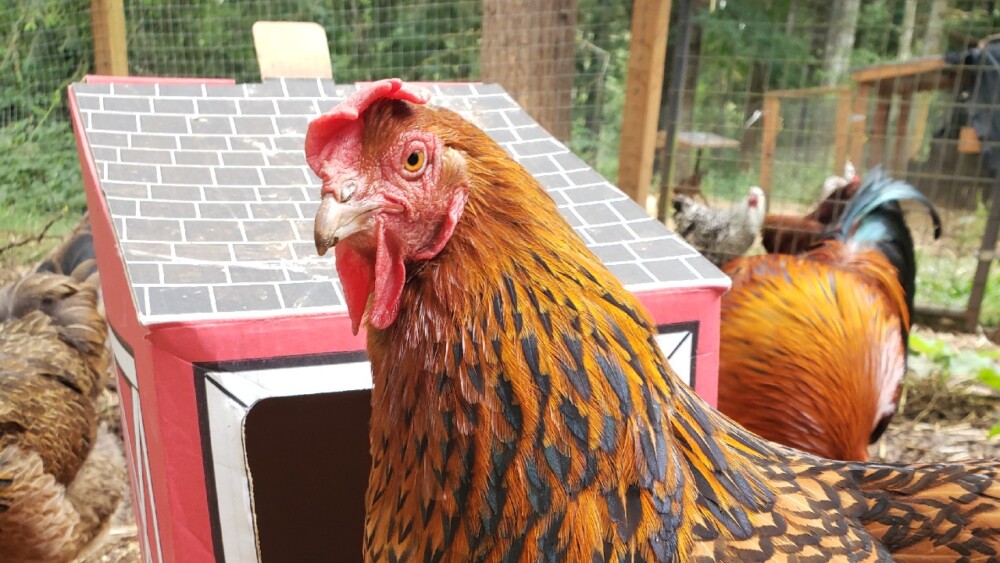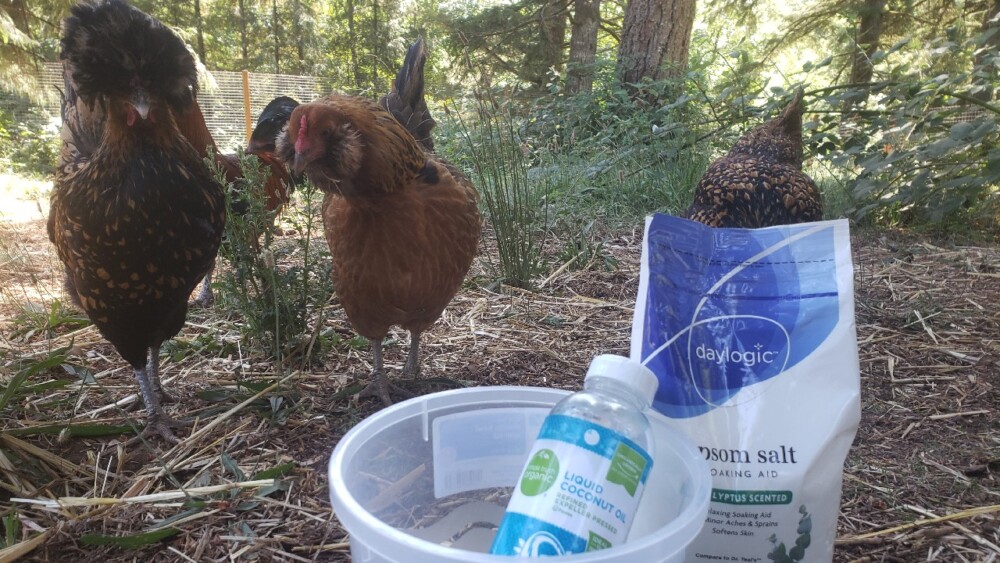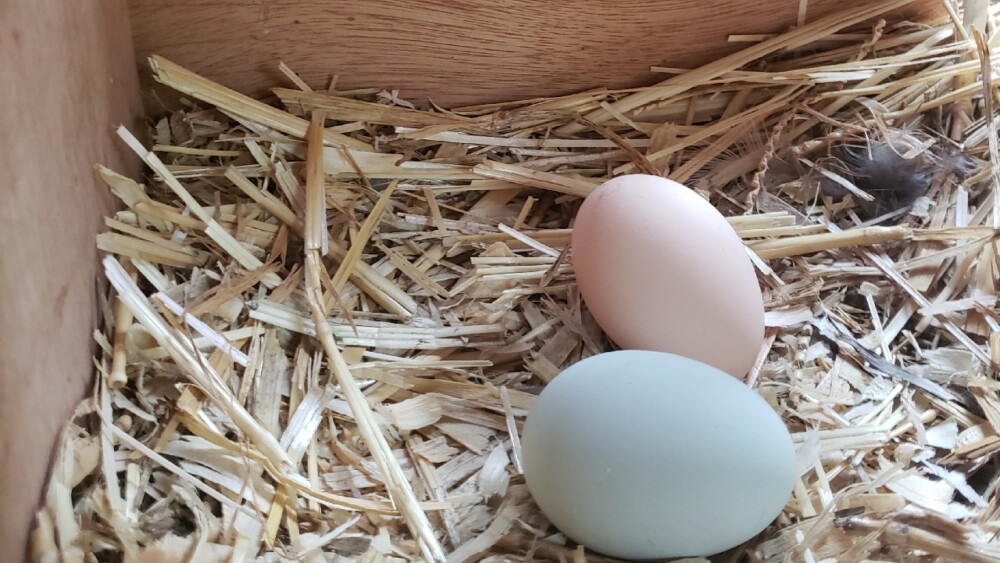Egg-laying issues are some of the most common health concerns for backyard flocks. Over the last three years, I’ve lost two egg-bound chickens, but I’ve also saved three suffering from this condition.
An egg-bound hen is not always a death sentence, but it’s severe and also a common condition chicken keepers deal with every year at some point. Finding your hen egg-bound can be shocking.
How do you treat an egg-bound hen? If a hen is egg-bound, time is critical. You must help her to pass the egg. Isolate the hen from the flock and place her in an area without loud sounds or other startling components. Soak the hen’s bottom in Epsom salt mixed with warm water. “Grease” her with a natural lubricant such as olive oil to help the egg slide out. In rare cases, you can attempt to remove the egg, but this carries the risk of infection and injury to the hen. It may sound easy to help an egg-bound hen, but there are more variables involved. And, establishing preventative care can help to minimize the frequency of egg-bound hens.
What causes egg-bound chickens? Some chickens have trouble laying eggs. Egg binding occurs most frequently in a young hen or one that hasn’t laid for a while. Insufficient calcium or other minerals aggravate it. Often hens who haven’t laid for several months or at all will lay a larger than usual egg for the first time. A large egg can cause egg binding. Hens that regularly have issues with egg binding are unlikely to recover.
Differences Between Vent Prolapse and Egg-Binding
Prolapse, egg bound, and broody hens can look similar. Many people group them and list the causes, type of treatment, and recovery as one.
A hen suffers from prolapse when part of her oviduct sticks out through the vent to the outside.
A hen having trouble laying an egg is egg-bound.
Both prolapse and egg binding share a list of common causes.
- Poor nutrition (including feeding too many snacks or “junk food.”
- Obesity
- Tendency to lay odd or misshapen eggs
- Oviduct infections
- Reproductive infections
- Artificial lighting
- Parasites or worms
Egg-Binding Symptoms and Signs
A hen that’s looking for a place to lay an egg looks different than an egg-bound hen. Some hens are picky about where they lay their eggs. Some chickens may try ten nesting boxes before landing on the “right” box, and sometimes they take so long they pop out an egg on the ground.
However, if a chicken is egg-bound, you’ll notice specific signs. This behavior is different from a hen running around looking for the perfect spot to lay. And it’s different from a hen that chooses to lay an egg on top of another chicken in the same nesting box.
- Straining to lay
- Staggering
- Lethargic with tail down
- Liquid may be dripping from the vent
- Wings may be hanging down
How Long Do You Have?
Chicken keepers have between 24-48 hours to intervene before their chicken possibly dies. Your chicken needs an extra hand, and treatment options will vary, pending how long she’s been trying to lay and when you find her.
Observing your flock and knowing the behavior of each bird is the best way to spot a hen acting lethargic. Every chicken is different, and the birds in a flock may not always show the same signs. Always pick up your chickens and give them a good look over. Watch for the tail to be dropped down and if she appears to be pushing to lay an egg. A struggling hen may be near the nesting boxes but not actually in a nesting box.
Treatment Options Vary
An egg-bound chicken cannot poop and pass their feces, which means those toxins can build up inside her body. Not only is your chicken having issues laying an egg, but it also impacts its digestive tract.
If your chicken is egg-bound, you should take action, so your hen has a chance at passing her egg and surviving this condition. There are many treatment options. It is best to start with a natural remedy as soon as you discover this is the issue. (Plus, not many vets treat hens, so natural remedies may be your only option).
Natural Remedies for Egg Bound Hens
There are several essentials you’ll need to help an egg-bound chicken. These simple items should already be in your first-aid kit. If these are not materials you have access to, create a DIY egg-bound kit specifically for this emergency.
- Epsom salts
- Coconut, olive, or vegetable oil
- Large tub or bowl for soaking
- Access to warm water
- Liquid calcium formulated for birds
- Nutri-drench, which you can order online
- A dog crate and a towel
- Disposable gloves
1. Isolate the Hen
Do you have a quiet area for sick birds? Place the egg-bound hen in a ‘hospital crate’ so she can be by herself. Put her in an area that’s quieter and away from loud noises or pets that could scare her. Offer some layer feed with warm water mixed into the food. Also, offer oyster shells as a calcium supplement. You can also dissolve two tums in her water dish if you think your bird will drink this while you prep the area. Calcium is known to stimulate the laying process.
The bedding should consist of clean towels in the crate. These need to be kept clean, and you’ll want to continuously change the bedding throughout the day.
2. Prepare a Soak
After you’ve set up a quiet place, prepare the warm water soak with the tub or bowl. First, wash your hen’s lower half in warm water. Add ½ cup of Epsom salt. This soaking technique acts as both a toxin flush and laxative. Gently soak your chicken until the water cools and set the timer to last about ten to 20 minutes. If this is highly stressful for your chicken, stop and place her back in the crate for a while.
3. Apply a Lubricant
The goal of this step is to massage the abdomen toward the vent area. You may be able to feel the egg while massaging this region. Use either vegetable or coconut oil as the lubricant. Avoid vaseline because it’s petroleum-based. Rub about a tablespoon around her vent area. You can also lube your glove and feel for the egg. Olive oil also works well.
4. Rest and Relaxation
If it’s warm out and she can quickly dry without getting a chill, you can leave her with a towel over her crate. If it’s winter, you should use a blow-dryer to make sure she’s completely dry. Now immediately place her back in the hospital crate and leave her alone for at least 8-12 hours. Ideally, she will pass the egg within 24-hours. No progress within 24 hours is dangerous. Place the crate in a dark area or a towel over the top.
It’s Risky to Try and Remove the Shell
Sometimes only a vet can remove an egg. Without experience, removing an egg from an egg-bound chicken is risky. It is possible, but watching a few YouTube videos is typically not enough to gain the expertise you’ll need to get the job done without accidentally hurting your chicken.
If nothing you do helps, then you can try and remove the shell as a last resort. But, that should be a last resort because of the high risk. Removing an egg wrong can result in cutting and injuring your hen’s internal organs. It can also result in infection from left-over egg yolk. I would only attempt to remove a shell if I was sure that my hen would die without it.
Overall Recovery and Care
You’ll want to keep the hen in the crate for several days until she’s eating and drinking normally. Recovery may take several days or weeks. The goal is to keep her comfortable after she passes an egg, and it may be two or three days before she starts to act normal again.
Find ways to integrate her back into the chicken coop slowly. You may want to use a quarantined area so the others can see her but not touch her. This could be a crate in the coop for a few days. But, be aware that confining her in view of the flock may change the pecking order and lower rank (see article on bullying).
Repeated Episodes of Egg-Binding
Adding extra calcium to your flock’s diet should help prevent this from happening. However, If you have a chicken or chickens that are egg-bound several times throughout the year, a humane euthanization may be best. Sometimes a chicken (young or old) may have reproductive issues that never resolve.
Prevent Egg Bound Hens
Some experts recommend a variety of ways to prevent this from happening to your flock. Here are tips for newbie chicken keepers.
- Buy quality layer feed for your hens
- Supplement with calcium, try oyster shells
- Always keep in mind the age range of your birds. Older birds may not lay as much.
- Your flock should only get a small number of treats each day
- Adding artificial light during the winter may impact your flock’s overall health
- Research what a prolapsed vent looks like so you know the difference between this and an egg-bound chicken
- Always observe your flock, so you know what ‘‘normal behavior’ looks like, and you’ll quickly recognize when a chicken is sick
I feed a layer diet with 16 percent protein which experts recommend. According to Oregon State University, “Layer feeds are formulated for chickens that are laying table eggs (those used for food). Layer feeds contain about 16 percent protein and extra calcium, so the chickens will lay eggs with strong shells. Start feeding layer feeds at about 20 weeks of age or when the first egg is laid, whichever occurs first.” Consider these best practices to prevent an egg-bound chicken.
- A healthy diet of layer feed with appropriate protein levels
- Calcium supplements like an oyster shell
- Avoid too much protein (e.g., mealworms) can be a bad thing in some cases
- Providing supplemental light in the winter may cause this to occur
A Broody Chicken May Look Egg-Bound
In some cases, an egg-bound hen may be confused for a broody hen. If you see a hen sitting on the nest and refusing to move, then your chicken is broody! Do not be alarmed as your chickens stop laying eggs when they want to hatch babies.
This may even be the behavior you want to encourage if you’re looking to add more chickens to your flock. Please don’t confuse it with an egg-bound hen. This chicken won’t be lethargic – in fact, she’ll be vibrant, energetic, and may puff up and squeak at you!
Egg Quality Problems
If you notice ongoing egg quality problems, then you should consider that your hen has a reproductive problem and may end up egg-bound at some point. This isn’t always the case, but there are egg defects that happen from stress, health, and environmental issues.
- Thin shells
- Soft or no shell
- Blood-stained shells
- Shell crinkle
- Watery whites
- Sandpaper texture
- A bulge around the equator of the shell
Conclusion
An egg-bound chicken is a severe but common health issue. If you live with chickens, this is a health issue that can be managed at home, but there are times when a vet may need to get involved.
Always try these steps first as I’ve had hens pass eggs, and then after a short recovery period, they are ready to go back into the flock. You’ll know after 24 hours if the issue seems to be severe enough for a more seasoned vet or expert to get involved to save your chicken.
My Favorite Chicken and Duck Supplies
This list contains affiliate products. Affiliate products do not cost more but helps to support BestFarmAnimals and our goal to provide farm animal owners with accurate and helpful information.
Manna Pro Oyster Shell keeps eggs strong. Before I gave my chickens oyster shell, I had the oddest eggs, many with weak and irregular shells. Now, I don’t have an issue.
Layer Feed by Manna Pro. I like pellets rather than crumbles as my chickens eat them better and less gets wasted or scavenged by rodents. A good layer feed makes the difference in hens laying many more eggs.
My chickens love this mealworm treat, which gives added protein, something that’s great during molting and winter months.
There are many ways to feed and water your chickens. I like this food and water setup the best because it reduces waste, saves me time feeding and watering, and keeps the food fresh longer. Except, in the winter, I use a heated waterer. The only problem is the heated waterers need to be replaced every few years.
I love this chicken veggie hanger. It makes it easy to give your chickens produce from the garden and keep them occupied in the winter with a fresh head of lettuce.
These chicken toys are a hoot! They will help curb bullying and keep your chickens active, especially in the winter when hens tend to get more lethargic.



